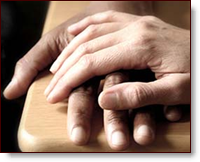 Compassion overruled a machine gun this week. The actions of one courageous school clerk at a Georgia elementary school saved countless lives. The skills she demonstrated in convincing a desperate man to put down his weapons can teach all of us how to resolve conflicts.
Most of us will (thankfully) never face a conflict as intense as Antoinette Tuff. Tuff is the school office worker at Ronald E. McNair Discovery Learning Academy whose actions on Tuesday stopped a shooter armed with a machine gun and hundreds of rounds of ammunition. On the 911 recording that was released, we can hear the remarkable way Tuff worked with the gunman. Three things stood out to me as valuable skills for peacefully resolving conflict.
Connection.
Tuff talked with the shooter, and connected with him. She stayed calm, and worked to understand what was happening for him and what he needed. When the shooter steps outside at the beginning and fires at police, she could have run or hidden. But she stayed and kept working with him. She relays messages to the 911 dispatcher and asks the shooter respectfully, “Now what did you want me to tell her, sir?” I imagine he felt understood and respected by Tuff, which calmed him down.
Vulnerability.
Tuff was willing to open up and share her own stories of struggling in life. She told him how she had gone through a difficult divorce and had even been suicidal before. She offered him hope by letting him know that she made it through her difficult times. Her willingness to be vulnerable deepened the trust she created with the gunman.
Compassion.
As the time goes on and she learns more about the gunman’s struggles, she shifts into a more nurturing mode and even uses terms of affection with him. She reassures him that he hasn’t hurt anyone and he is doing the right thing by putting down his gun and surrendering. Her compassion is breathtaking: “We’re not going to hate you baby. Its a good thing that you’re giving up so we’re not going to hate you. . . . It’s gonna be all right, sweetie. I just want you to know that I love you, though, OK? And I’m proud of you. That’s a good thing. You’ve just given up. Don’t worry about it.”
If Tuff can do those things when faced with a gun, then the rest of us can do the same in much more mundane situations. These are the skills we work to develop with our clients in Collaborative divorce practice. Divorce can bring out high conflict, but it doesn’t have to lead to emotional destruction. Following Tuff’s lead can bring peace.
Compassion overruled a machine gun this week. The actions of one courageous school clerk at a Georgia elementary school saved countless lives. The skills she demonstrated in convincing a desperate man to put down his weapons can teach all of us how to resolve conflicts.
Most of us will (thankfully) never face a conflict as intense as Antoinette Tuff. Tuff is the school office worker at Ronald E. McNair Discovery Learning Academy whose actions on Tuesday stopped a shooter armed with a machine gun and hundreds of rounds of ammunition. On the 911 recording that was released, we can hear the remarkable way Tuff worked with the gunman. Three things stood out to me as valuable skills for peacefully resolving conflict.
Connection.
Tuff talked with the shooter, and connected with him. She stayed calm, and worked to understand what was happening for him and what he needed. When the shooter steps outside at the beginning and fires at police, she could have run or hidden. But she stayed and kept working with him. She relays messages to the 911 dispatcher and asks the shooter respectfully, “Now what did you want me to tell her, sir?” I imagine he felt understood and respected by Tuff, which calmed him down.
Vulnerability.
Tuff was willing to open up and share her own stories of struggling in life. She told him how she had gone through a difficult divorce and had even been suicidal before. She offered him hope by letting him know that she made it through her difficult times. Her willingness to be vulnerable deepened the trust she created with the gunman.
Compassion.
As the time goes on and she learns more about the gunman’s struggles, she shifts into a more nurturing mode and even uses terms of affection with him. She reassures him that he hasn’t hurt anyone and he is doing the right thing by putting down his gun and surrendering. Her compassion is breathtaking: “We’re not going to hate you baby. Its a good thing that you’re giving up so we’re not going to hate you. . . . It’s gonna be all right, sweetie. I just want you to know that I love you, though, OK? And I’m proud of you. That’s a good thing. You’ve just given up. Don’t worry about it.”
If Tuff can do those things when faced with a gun, then the rest of us can do the same in much more mundane situations. These are the skills we work to develop with our clients in Collaborative divorce practice. Divorce can bring out high conflict, but it doesn’t have to lead to emotional destruction. Following Tuff’s lead can bring peace.
Two Paths, One Decision: The Divorce Dilemma
Emily and Daniel were in love. Their love story had once been the envy of the neighborhood—a whirlwind romance that blossomed into a marriage filled with laughter, shared dreams, and whispered secrets. But as the years went by, cracks appeared in their fairy tale....



